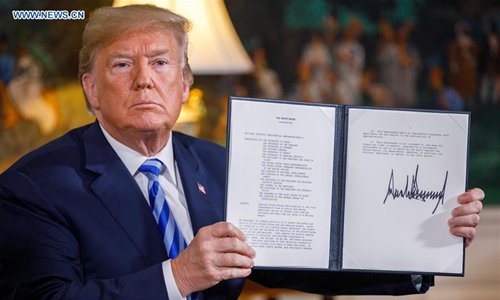
(Photo: Xinhua)
Few ordinary people have a full knowledge of the Iran nuclear deal, but everyone knows that the US government just announced it was quitting. People also know that it is an agreement formally signed by the five permanent members of the UN Security Council, Germany and Iran, endorsed by the UN, but now has been rendered invalid after a new US president took power. US President Donald Trump's decision to pull Washington out of the deal will tarnish the reputation of the superpower.
All European signatories opposed Washington's withdrawal. The Iran nuclear deal was a hard-won achievement following two years' negotiations. The White House may have considered withdrawing from the deal after taking into account US domestic politics. Trump himself has no good feelings for Iran and as a result, made the decision without respect for the consequences.
Ripping up multilateral agreements and launching a radical trade war: Today's US has become a highly unpredictable superpower. With strong executive capability and unrestrained capriciousness, Washington looks increasingly likely to do something silly.
What can Washington gain from dumping the deal and reimposing sanctions on Iran? The alleged gains are overwhelmed by losses. The withdrawal was welcomed by some Middle Eastern countries hostile to Iran, but will for sure have an impact on North Korea. Seeing the international pact so easily overturned by the new US government, Pyongyang will be less confident about a potential nuclear deal with Washington.
The resumed sanctions will put at risk European companies doing business with Iran. The US Ambassador to Germany urged German firms to immediately "wind down operations" in Iran. Although Washington didn't request other signatories tear up the deal, European enterprises may be sanctioned by the US if they refuse to coordinate.
Does the White House intend to seize this moment as an opportunity to deal a blow to European companies? After all, Washington doesn't want American companies doing business with Iran, so shouldn't European companies leave too? Despite their status as US allies, European countries can exert no influence on Washington. The White House hasn't taken the EU's advice on the Iran nuclear deal.
The fundamental reason for Trump's willfulness is the disunity of the world. For a long time the US has been the world's No.1 power with the largest number of allies. Unity was rare among countries bullied or coerced by the US, be they Arabian or European.
Crippling Iran seems to be Washington's main intent. Iran has long been the US' major target in the Middle East. The White House doesn't want to reconcile with the country and perhaps regards Iran as a tool to further split the Middle East and so expand American clout in the region.
Iran may wield its regional influence and take asymmetric retaliatory measures against the US. Although Washington is much stronger than Tehran, examples of countries smaller than Iran making trouble for the US are common in the Middle East. The US and Iran may drag the Gulf into turmoil again.


